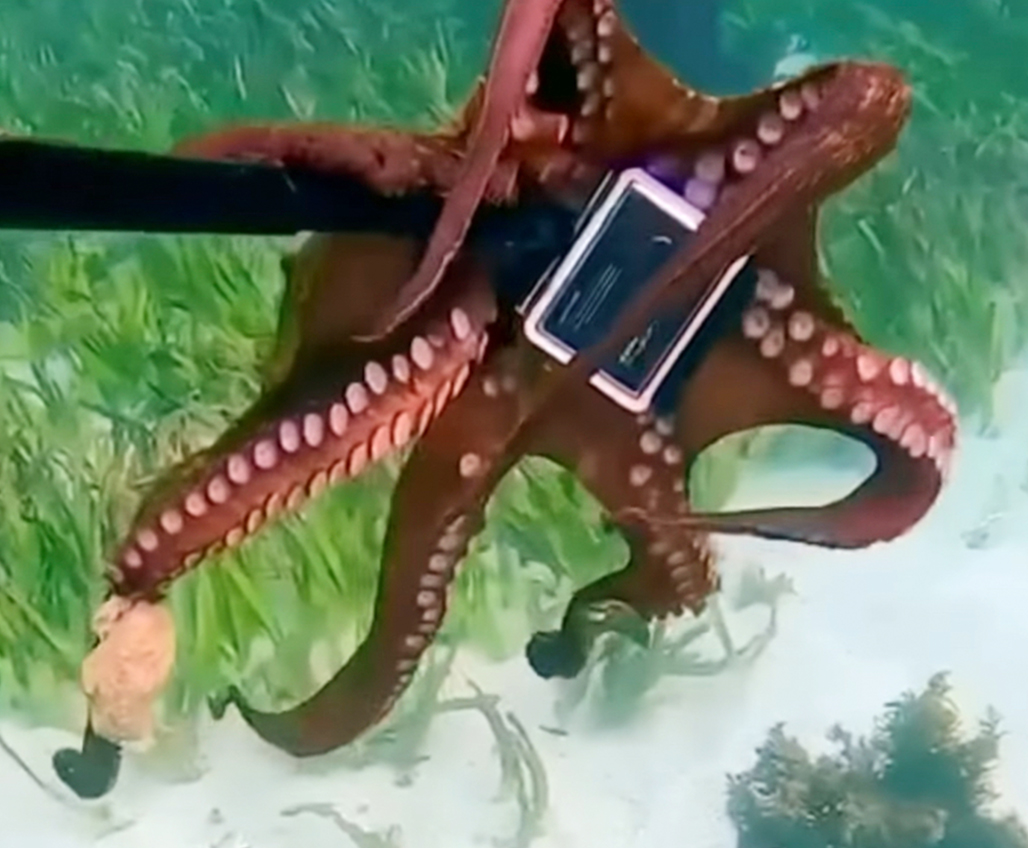
The brazen thief was caught red-handed. Photo: Jervis Bay Through My Eyes.
An underwater photographer dived into action to retrieve a GoPro after it was stolen by a cheeky octopus in Jervis Bay this month.
Maree Clout from Jervis Bay Through My Eyes managed to wrangle the camera and selfie stick from the brazen cephalopod after it was taken from 15-year-old snorkeller Jesse Loffel near Murrays Breakwall in the Boderee National Park.
“A young guy appeared next to us and when I asked him if he was ok, he replied that he needed our help,” Maree said.
“I had all sorts of dilemmas go through my mind. I asked him what was wrong and his reply was ‘An octopus took my camera’.
“He took us to where he last saw his camera and sure enough, there was the eight-armed ‘robber’ with each of them tightly wrapped around the GoPro.
“After filming the octopus hugging his loot, I dived down and picked up the handle.”
Maree said she wiggled the camera sideways a few times before the occy reluctantly let go.
“He really didn’t want to let it go, so I had no choice but to lift the GoPro up with it on it. Man, he was heavy,” she added.
Maree’s off-sider Pary Vlandis from All Things Jervis Bay filmed the entire extraction, which has fascinated their social media fans.
Maree, 52, has lived in Jervis Bay her whole life and she snorkels at least once a week with friends Pary and Michelle Stewart.
“It’s nothing for us to be in the water for two hours or more. Even in winter,” she said.
According to Maree, winter is the best time for snorkelling because Port Jackson sharks and Giant Cuttlefish visit, as well as the “gorgeous” octopuses.
“I’ve learnt to love octopuses, so I wasn’t too worried about trying to get the camera back,” she said.
“We often watch the comings and goings of these guys. If we give them a little gift, usually a shell, they will immediately reach out their tentacles to grab it.”
According to University of Queensland researchers, octopuses possess a unique brainpower and are known for their intelligence and Houdini-like escapes.
Dr Wen-Sung Chung from UQ’s Queensland Brain Institute says the octopus is a “master of camouflage, capable of solving complex tasks and their cognitive ability is said to approach that of some small mammals”.
The reef octopuses, like those found in Jervis Bay, have a significantly larger brain than their deep-sea cousins, with some properties similar to primates, adapted for complex visual tasks and social interaction in a busy, well-lit environment.
“These octopuses have some remarkably complex behaviours not known in other octopuses,” Dr Chung said.
The gloomy or common Sydney octopus is native to the waters off the coasts of Australia and New Zealand. It has a rusty brown colouration and white eyes. The octopus mostly eats molluscs but has also been documented eating members of its own species, according to the Australian Museum.
During 2014 and 2015 gloomy octopuses were caught on film hurling silt and shells at one another in Jervis Bay.
Original Article published by Katrina Condie on Region Illawarra.












